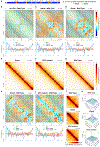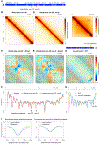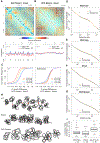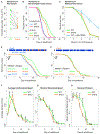X Chromosome Domain Architecture Regulates Caenorhabditis elegans Lifespan but Not Dosage Compensation
- PMID: 31495695
- PMCID: PMC6810858
- DOI: 10.1016/j.devcel.2019.08.004
X Chromosome Domain Architecture Regulates Caenorhabditis elegans Lifespan but Not Dosage Compensation
Abstract
Mechanisms establishing higher-order chromosome structures and their roles in gene regulation are elusive. We analyzed chromosome architecture during nematode X chromosome dosage compensation, which represses transcription via a dosage-compensation condensin complex (DCC) that binds hermaphrodite Xs and establishes megabase-sized topologically associating domains (TADs). We show that DCC binding at high-occupancy sites (rex sites) defines eight TAD boundaries. Single rex deletions disrupted boundaries, and single insertions created new boundaries, demonstrating that a rex site is necessary and sufficient to define DCC-dependent boundary locations. Deleting eight rex sites (8rexΔ) recapitulated TAD structure of DCC mutants, permitting analysis when chromosome-wide domain architecture was disrupted but most DCC binding remained. 8rexΔ animals exhibited no changes in X expression and lacked dosage-compensation mutant phenotypes. Hence, TAD boundaries are neither the cause nor the consequence of DCC-mediated gene repression. Abrogating TAD structure did, however, reduce thermotolerance, accelerate aging, and shorten lifespan, implicating chromosome architecture in stress responses and aging.
Keywords: X chromosome dosage compensation; aging; condensin; gene expression; higher-order chromosome structure; lifespan; proteotoxic stress; topologically associating domains.
Copyright © 2019 Elsevier Inc. All rights reserved.
Conflict of interest statement
DECLARATION OF INTERESTS
The authors declare no competing interests.
Figures






Comment in
-
TADs for Life: Chromatin Domain Organization Regulates Lifespan in C. elegans.Dev Cell. 2019 Oct 21;51(2):131-132. doi: 10.1016/j.devcel.2019.09.021. Dev Cell. 2019. PMID: 31639364
References
Publication types
MeSH terms
Substances
Grants and funding
LinkOut - more resources
Full Text Sources
Other Literature Sources
Molecular Biology Databases

